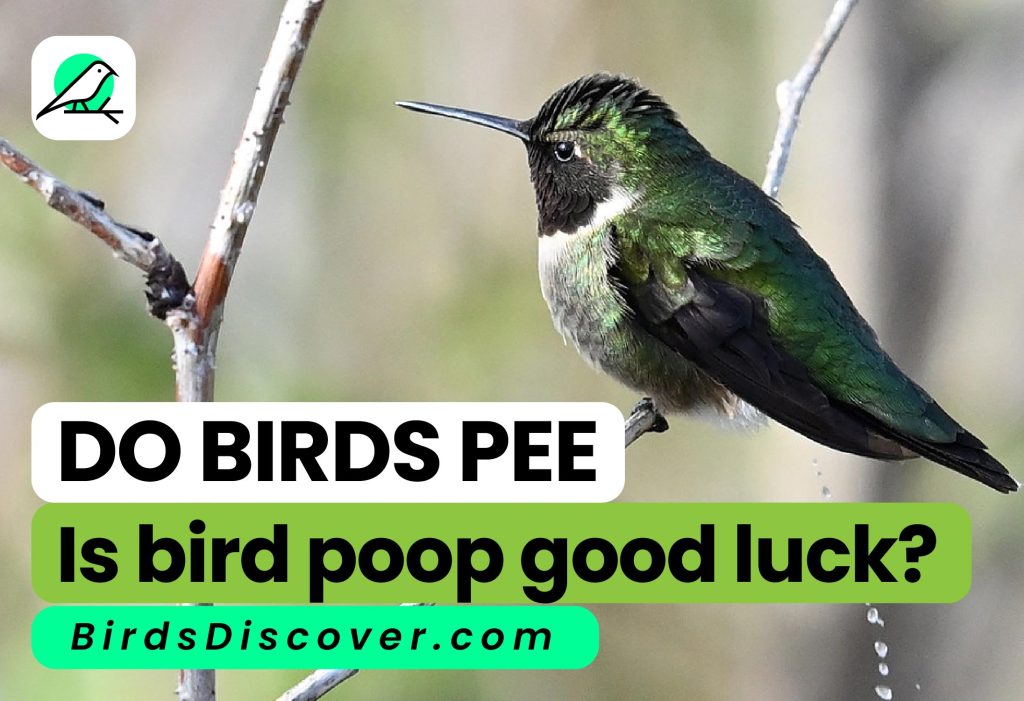DO BIRDS PEE : Is bird poop good luck?

Do Birds Pee?
No, birds do not pee in the same way mammals do. Instead of producing liquid urine, birds excrete a semi-solid paste that combines both uric acid (from the kidneys) and feces (from the digestive tract) through a single opening called the cloaca. This method conserves water, which is crucial for birds’ survival.
Does birds produce urine?
Yes, birds produce urine, but it is different from the liquid urine produced by mammals. Birds excrete uric acid instead of urea, which results in a semi-solid paste. This paste combines with feces and is expelled through a single opening called the cloaca. This method conserves water, making it an efficient process for birds’ bodies.
- Uric Acid Production: Birds produce uric acid instead of urea, which conserves water and results in a semi-solid waste.
- Cloaca: Birds expel both urine and feces through the cloaca, a single opening used for excretion.
- Water Conservation: Producing uric acid helps birds conserve water, which is crucial for their survival.
- Efficient Excretion: The combination of urine and feces into a single waste product is an efficient way to manage excretion.
- Semi-Solid Paste: Bird urine is not liquid but a semi-solid paste that is often white and mixed with darker fecal matter.
- Adaptation: This excretion method is an adaptation that allows birds to thrive in various environments, including those where water is scarce.
bird poo made of?
Bird poo is made of both feces and uric acid. Unlike mammals, birds excrete their nitrogenous waste in the form of uric acid rather than urea, resulting in a semi-solid paste. This paste is typically white and combines with the darker solid waste from the digestive system. The white part is the uric acid, and the darker part is the feces. This combination is expelled through a single opening called the cloaca.
Comparison of Nitrogen Excretion Between Humans and Birds
| Aspect | Human Body | Bird Body |
|---|---|---|
| Primary Waste Product | Urea | Uric acid |
| Form of Excretion | Liquid urine | Semi-solid paste |
| Water Conservation | Less efficient; more water lost in urine | More efficient; conserves water |
| Excretion Method | Through the urinary tract and out of the body via the urethra | Through the cloaca, combined with feces |
| Appearance of Waste | Clear to yellowish liquid | White (uric acid) mixed with darker feces |
| Energy Requirement | Lower energy required to produce urea | Higher energy required to produce uric acid |
| Impact on Environment | Higher water usage | Lower water usage |
Is Bird Poop White Why?
Bird poop appears white because birds excrete nitrogenous waste in the form of uric acid, which is a white, paste-like substance. This process is different from mammals, which excrete urea in liquid form. The uric acid combines with the fecal matter, resulting in the characteristic white and dark droppings seen in bird poop. This adaptation helps birds conserve water and efficiently manage waste.
- Uric Acid Excretion: Birds excrete nitrogenous waste as uric acid, which is white and paste-like.
- Water Conservation: The production of uric acid helps birds conserve water, as it requires less water to excrete than urea.
- Combination with Feces: Bird poop consists of both uric acid and fecal matter, creating the distinctive white and dark appearance.
- Single Excretion Point: Birds use the cloaca to expel both uric acid and feces simultaneously.
- Efficient Waste Management: This method of excretion is more efficient for birds, allowing them to thrive in various environments, including those with limited water.
- Adaptation: The white color of bird poop is a result of evolutionary adaptation to conserve water and efficiently excrete waste.
Bird Pellets: Insights into Avian Diets
Pellet Formation two lines
Pellet formation occurs when birds, such as owls and hawks, regurgitate indigestible parts of their prey, like bones and fur. This process helps them clear their digestive system of material that cannot be digested.
Owl Pellets
Owl pellets are compact masses of indigestible materials such as bones, fur, and feathers that owls regurgitate. They provide insight into the owl’s diet and local prey species
Pellet Characteristics
Pellets are compact masses containing indigestible parts of a bird’s prey, such as bones, fur, and feathers, and are typically oval or cylindrical in shape. They vary in size and color depending on the bird species and its diet, and are regurgitated regularly to clear the digestive system.
Contents
Pellets contain indigestible materials such as bones, fur, feathers, and insect exoskeletons from the bird’s diet. These components are compacted in the gizzard and regurgitated as a pellet.
Insights
Insights from examining pellets include understanding the bird’s diet, identifying prey species, and assessing local biodiversity. Pellets provide valuable information about the feeding habits and ecological role of the bird, as well as the health and composition of the ecosystem it inhabits.
| Aspect | Details |
|---|---|
| Fertilizer | Bird poo is rich in nutrients like nitrogen, phosphorus, and potassium, which enhance soil fertility. It is used in agriculture and gardening to improve crop yields and soil health. |
| Ecological Indicator | The composition and quantity of bird poo can reveal information about the bird’s diet and the health of local bird populations. It helps monitor changes in ecosystems and biodiversity. |
| Waste Management | Bird poo contributes to the natural decomposition process, breaking down organic matter and returning nutrients to the soil. This supports nutrient cycling and ecosystem function. |
| Cultural Practices | In some cultures, bird poo is used in traditional farming methods and gardening practices. It can be employed as a natural fertilizer, reflecting sustainable agricultural techniques. |
Bird Urine Storage Myth
The myth that birds store urine is unfounded; birds do not produce liquid urine but instead excrete uric acid as a semi-solid paste. This adaptation conserves water and prevents the need for urine storage. Birds’ waste management is efficient, combining feces and uric acid into one excretion process.
- Uric Acid Excretion: Birds produce uric acid, not liquid urine, which conserves water.
- No Storage: Birds do not have a mechanism for storing urine, as it is not produced in liquid form.
- Efficient Waste Management: The combination of feces and uric acid in one excretion process is both water-efficient and effective.
Bird Urine Release
Bird urine, actually a mix of uric acid and feces, is released in the following manner:
- Cloaca: Birds expel waste through the cloaca, a single opening used for both excretion and reproduction.
- Combined Waste: Uric acid (white paste) and feces (dark matter) are mixed and released simultaneously.
- Frequency: Birds typically excrete waste multiple times a day, depending on their diet and fluid intake.
- No Liquid Urine: Birds do not produce liquid urine; their waste is semi-solid to conserve water.
- Efficiency: This method helps birds efficiently manage waste while conserving water, especially in arid environments.
Bird Urine Release and Cloacal Mechanisms
| Aspect | Details |
|---|---|
| Cloaca Function | The cloaca is a multi-purpose opening used for excretion, reproduction, and laying eggs. It allows for the expulsion of both waste and reproductive fluids. |
| Waste Composition | Birds excrete a semi-solid mixture of uric acid and feces. Uric acid appears as a white paste, while feces are darker. |
| Excretion Process | Waste is formed in the kidneys and intestines, mixed in the cloaca, and expelled through the same opening. |
| Frequency | Birds typically excrete waste several times a day, depending on their diet, fluid intake, and metabolic rate. |
| Water Conservation | The production of semi-solid waste helps conserve water, reducing the need for liquid excretion and making it suitable for various habitats. |
Do birds pee during flying?
Birds do not typically urinate while flying. They produce a semi-solid waste mixture of uric acid and feces, which they usually expel when perched or on the ground. During flight, birds do not have a mechanism to release waste, as their body is focused on maintaining aerodynamics and energy efficiency. Their digestive system is designed to minimize waste production and conserve water, which helps prevent the need for frequent waste expulsion. While in flight, birds generally hold waste until they land. However, if they do need to relieve themselves during flight, it may be done quickly and sporadically.
Is bird pee dangerous?
Bird pee, which is actually a mixture of uric acid and feces, is generally not dangerous but can carry pathogens that pose health risks if not handled properly. Accumulated droppings can lead to respiratory issues or infections if disturbed.
Do birds have penises?
Most birds do not have penises; instead, they have a cloaca, a single opening used for excretion and reproduction. However, a few bird species, like ducks and swans, do have a penis, which is used during mating.
Is it lucky to get peed on by a bird?
Getting peed on by a bird is not traditionally considered lucky. While some people might view it as a quirky sign or a humorous occurrence, bird droppings are generally more associated with minor inconvenience or potential health concerns. In some cultures, bird droppings might be seen as a sign of good luck or a blessing, but this is more a matter of personal or cultural belief than an established superstition.
| Location | Belief |
|---|---|
| Western Cultures | Bird droppings are often seen as a nuisance rather than a sign of luck. |
| Eastern Cultures | In some Asian cultures, bird droppings are considered a sign of good luck or prosperity. |
| Indigenous Beliefs | Various indigenous cultures may interpret bird droppings as a message from the spirit world or a sign of a blessing. |
| Modern Superstitions | In contemporary times, bird droppings are often seen humorously or as a minor inconvenience, with few believing in luck. |
What to Do if A Bird Poops on you?
Clean Up: Immediately clean the affected area with soap and water to remove the waste and prevent any potential skin irritation or infection.
Launder Clothes: If the droppings have stained your clothing, wash the affected items promptly to prevent permanent stains.
Disinfect: If the bird droppings were on your skin or personal items, consider using a disinfectant to ensure thorough cleaning and reduce the risk of any bacteria or pathogens.
What Signifies a Bird Pooping on You?
Birds pooping on you is often considered a sign of good luck in various cultures. This belief stems from the idea that the occurrence is rare and unexpected, and it’s thought to symbolize a positive change or fortune coming your way. While it is primarily seen as a humorous or quirky event, some cultures and superstitions hold that it brings blessings or a stroke of good luck.
Is Bird Poop Truly Lucky?
The belief that bird poop is lucky is a cultural superstition rather than a fact. While some cultures view it as a sign of good fortune, it is more commonly seen as a minor inconvenience.
Reasons Behind the Belief
The belief that bird poop is lucky often stems from its rarity and unexpected nature, suggesting that an unusual event might bring positive change. Additionally, cultural traditions and superstitions have historically ascribed favorable omens to such occurrences.
Can a Drop of Bird Poop Bring Fortune?
The idea that a drop of bird poop can bring fortune is rooted in superstition rather than fact. While some cultures view it as a sign of good luck or prosperity, there is no scientific evidence to support that bird droppings directly influence one’s fortune.
Harnessing the Power of Bird Poop
Bird poop can be harnessed as a nutrient-rich fertilizer to enhance soil fertility and support plant growth. Additionally, it aids in composting and provides valuable insights into avian diets and ecosystem health.
Cultural Variations in Belief
Cultural beliefs about bird poop vary widely: some cultures view it as a sign of good luck or prosperity, while others see it merely as a minor inconvenience. These interpretations reflect differing values and traditions across societies.
Bird Poop Superstitions in Different Cultures
| Culture | Belief in Bird Poop as Good Luck |
|---|---|
| Russian | Considered a sign of upcoming financial gain or good fortune. |
| Turkish | Believed to bring prosperity and success, especially if it lands on clothing or belongings. |
| Indian | Seen as a positive omen, symbolizing blessings and potential positive changes in one’s life. |
| Japanese | Often regarded humorously, with some seeing it as a sign of good luck or a friendly gesture. |
| South Korean | Sometimes viewed as a blessing or a sign of positive change in one’s fortunes. |
| Polish | Believed to be a sign of good luck and an indication that one will receive unexpected gifts. |
Birds Have Kidney
Yes, birds have kidneys, which filter blood to remove waste and produce uric acid. Their kidneys play a crucial role in conserving water and managing electrolytes, adapting to their unique metabolic needs.
Bird Pee is Yellow?
Bird pee, which is actually a mix of uric acid and feces, is typically white rather than yellow. The uric acid appears as a white paste, and the feces can be dark, often giving the waste its characteristic appearance.
Do birds pee when they die?
When birds die, they do not continue to excrete waste as their bodily functions cease. Any remaining waste in their cloaca may eventually be expelled post-mortem due to the natural decomposition process, but active peeing does not occur after death
FAQs
Do birds pee like mammals do?
No, birds do not produce liquid urine like mammals. Instead, they excrete a semi-solid mixture of uric acid and feces through the cloaca.
How do birds eliminate waste if they don’t pee?
Birds eliminate waste through a combination of uric acid and feces expelled from the cloaca. This mixture forms a semi-solid substance that conserves water and is ejected in one process.
Why don’t birds have bladders?
Birds don’t have bladders because their lightweight, efficient excretion system helps conserve water and maintain flight. Instead, they excrete a semi-solid mixture of uric acid and feces directly through the cloaca.
Is bird poop just a mixture of uric acid and feces?
Yes, bird poop is a mixture of uric acid and feces. The uric acid appears as a white paste, while the feces are usually darker in color.
What is the purpose of uric acid in birds?
Uric acid in birds serves to efficiently excrete nitrogenous waste while conserving water. This adaptation helps birds maintain hydration and minimizes weight, supporting their flight.
Do birds release urine and feces simultaneously?
Yes, birds release urine and feces simultaneously as a combined semi-solid waste through the cloaca. This mixture includes uric acid and fecal matter.
Is it true that bird poop brings good luck?
The belief that bird poop brings good luck is a cultural superstition rather than a fact. While some cultures view it as a sign of fortune or blessings, it is generally seen as a minor inconvenience.
How should one handle bird droppings for hygiene?
To handle bird droppings hygienically, wear gloves to avoid direct contact and clean the area with soap and water. Use a disinfectant to ensure thorough sanitation, and dispose of the droppings and contaminated materials in a sealed bag. Finally, wash your hands thoroughly after cleaning.
Is it feasible to stay out of a bird’s poop?
Staying completely out of a bird’s poop can be challenging, especially in areas with high bird activity. However, you can minimize exposure by avoiding areas where birds frequently perch or nest, using protective covers for outdoor spaces, and regularly cleaning areas where birds congregate.
What color is bird pee?
Bird pee, or the uric acid component of bird droppings, is typically white. It appears as a chalky or paste-like substance, while the feces component can be darker in color.



